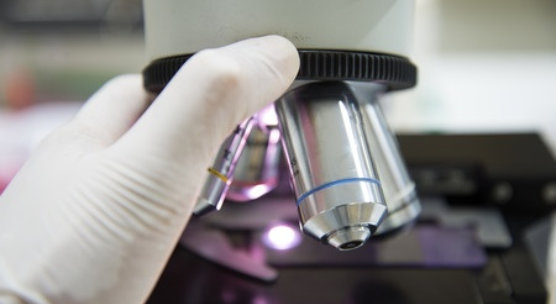Blood test points to much earlier detection of lung cancer
Published On Fri 9 Dec 2016 by Roddy Isles

A new blood test has been developed that can accurately detect antibodies to lung cancer cells at an early stage, potentially up to five years before traditional scans show any damage.
The early results of the largest ever randomised trial for lung cancer screening using the blood test in a population of approximately 12,000 high risk participants, are presented at the British Thoracic Society (BTS) Winter Meeting today (Friday 9th December 2016). The research is a collaboration between NHS Health Boards in Greater Glasgow and Clyde, Lanarkshire and Tayside, the Universities of Aberdeen, Dundee, Glasgow, Nottingham, Toronto, and the Scottish Cancer Registry.
Results show that nearly 1 in 10 (9.8%) of the group who received the blood test (approximately 6,000 people at higher risk of lung cancer) had results indicating antibodies present. These individuals were then investigated further with a chest x-ray and serial CT scans to look for signs of lung cancer.
To date, 16 cases of lung cancer have been diagnosed; three quarters of these were at an early stage. This is higher than expected from current clinical experience. Although these results are encouraging, it is too early to say whether the study will change clinical practice as the final results will only be available once data from participants in the control group are available and economic analysis is performed.
The study, being undertaken across Scotland, is a randomised trial with adults aged 50-75 years who are at high risk of lung cancer due to smoking heavily for 20 years or more, or due to a family history of lung cancer. Of these, 6,000 had the blood test for autoantibodies, and 6,000 received regular diagnosis and care. The study is now following study participants over a 2 year period to find out if this test can reduce the incidence of patients with late stage lung cancer (Stage III or IV) compared with routine care.
Over 46,000 people are diagnosed with lung cancer in the UK each year according to cancer registration statistics. This makes it the third most common form of cancer in the UK, after breast and prostate cancer, although it kills more people. The disease kills over 35,500 people a year and is the biggest cause of death from both cancer and lung disease for men and women.
Dr Stuart Schembri, Honorary Senior Lecturer University of Dundee, and Co-Chief Investigator of the study, said, “Lung cancer is a serious and life threatening illness and our best hope for successful treatment is to detect it as early as possible.
“Heavy smokers are particularly at risk, but it is just not possible to scan everyone who is considered high risk; and within those who are scanned, a CT scan alone can falsely suggest lung cancer or pick up incidental, non-clinically relevant findings, causing unnecessary worry and expense. We therefore need to find a way to identify which of the people at high risk need a scan and a way to detect lung cancer before patients present with symptoms.
“Research, over many years, has identified that when cancer is present – even at an undetectable level when it is not clinically evident – the body’s natural defence mechanism produces autoantibodies. These autoantibodies are in response to proteins on cancer cells, which are different to normal cells. By measuring in blood tests whether a person has these autoantibodies in their blood, we can determine if they might benefit from a CT scan.”
Dr Schembri added, “This test allows us to scan from a much more informed position and removes the stress around many patients unnecessarily having to go through a CT scan. But most importantly, we feel it may help us to detect lung cancer in its earliest stages when we have an improved chance of successful treatment.”
A further encouraging study being presented at the Winter Meeting is the National Lung Cancer Audit’s latest results on surgical activity. Capturing data from 4,892 cases who underwent surgery in 2013, it shows both an increase in the number of surgical procedures being undertaken to treat lung cancer and an increase in the survival rate.
Dr Paul Beckett, consultant lung specialist at Derby Teaching Hospitals NHS Trust, co-clinical lead of the National Lung Cancer Audit, and member of the British Thoracic Society, said, “The good news is that we’re seeing an increase in the volume of surgery being undertaken for lung cancer with very strong success rates. In the UK, only 1 in 6 lung cancer patients have surgery which is low compared to other countries. But this audit reveals that early survival rate is very high, with 96% of patients living beyond 90 days.
“This is very encouraging for both patients and health professionals alike. We need to spread this message widely, across both NHS and society, so more people with the condition undertake surgery and get the chance of living a longer life with a better quality of life.”
Note to Editors:
The blood test is called ‘Early CDT-Lung’
The British Thoracic Society is the UK’s professional body of respiratory specialists. The Society seeks to improve standards of care for people who have respiratory diseases and to support and develop those who provide that care. A registered charity, it has over 3,000 members including doctors, nurses, respiratory physiotherapists, scientists and other professionals with a respiratory interest.
For media enquiries contact:
Roddy Isles
Head of Corporate Communications
University of Dundee
Nethergate, Dundee, DD1 4HN
Tel: +44 (0)1382 384910
Mobile: 07800 581902
Email: r.isles@dundee.ac.uk